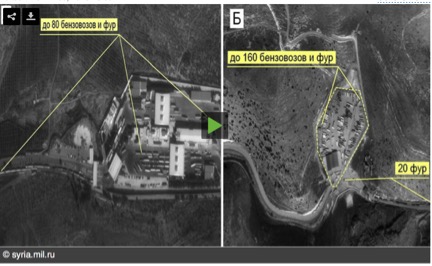| « Israel Attacks Jerusalem Palestinian Hospital | Obama’s Big Lie Claiming Russia Not Combating ISIS » |
NATO Defending Turkey – ISIS Oil Trade
By Michael Collins

By reinforcing the Turkish military presence along the routes of ISIS oil to Turkey, NATO is protecting the illicit ISIS oil trade that supports the reviled terrorist organization.
(Washington, DC 12/02) NATO announced Tuesday that it would send patrol aircraft and missile defense systems to bolster Turkey’s air defenses at that nation’s border with Syria. This announcement was made on the same day that the Russian Defense Ministry produced satellite imagery and other evidence showing what has been claimed for months, namely that Turkey is receiving oil sent by truck from ISIS oil wells in Iraq and Syria. (Image)
The United States government dismissed the Russian evidence consisting of images of miles of oil trucks originating at ISIS oil wells then crossing the Turkish border. ISIS oil ends up at two primary destinations, the Batman oil refinery in southeastern Turkey and Mediterranean ports near Turkey’s Adana province. The value of the oil trade via Turkey is estimated between $50 and $100 million a month. Without this income, ISIS would face considerable obstacles to its ongoing military aggression, terrorist activities around the world, and subjugation of Syrians and Iraqis living under ISIS rule.
The inevitable conclusion of this series of events is simple: By reinforcing the Turkish military presence along the routes of ISIS oil to Turkey, NATO is protecting the illicit ISIS oil trade that supports the reviled terrorist organization. Remarkably, NATO defense ministers endorsed the move without reference to the oil issue.
On November 24, NATO supported Turkey after it shot a Russian jet bombing the specific region of Syria held by rebels that serves as the conduit for ISIS oil bound for Turkey. According to the Turkish version of the incident, the Russian fighter was in Turkish airspace for a maximum of 17 seconds. After being hit with an air-to-air missile, the Russian fighter crashed in northern Syria. The Russians point out that the incursion, if there was one, did not represent a threat to Turkey and did not warrant aggressive action. In fact, shortly after the incident, Israel reported that a Russian jet had strayed into Israeli air space without any aggressive action by Israel.
Russian President Vladimir Putin said the shoot down of the Russian jet was a “stab in the back” by Turkey to support ISIS oil shipments and financial benefit of President Erdoğan.
Since the shoot down, President Putin has pressed the case against Turkey’s president, Recep Erdoğan, for his support of ISIS. At the G20 meeting in Turkey in late October, Putin produced an image showing miles of oil trucks leaving ISIS oil wells headed for Turkey and discussed a list of forty nations involved in oil purchases and other financial support of ISIS.
Russia bombed several oil convoys after that meeting.
Shortly after that, Turkey shot down a Russian jet fighter bombing a key area for ISIS oil smuggling to Turkey.
At the Paris climate conference following the shoot down, Putin made a specific claim about Turkey’s motivation for the shoot down: "The decision to shoot down the plane was dictated specifically by a desire to defend [ISIS oil] supplies" entering the “territory of Turkey.”
… and, yesterday, NATO installed air defense systems on the Turkey – Syria border claiming that the NATO “Alliance is indivisible and that Allies stand in strong solidarity with Turkey, which is facing multiple challenges from the south including terrorist threats.” NATO Press Release, December 1
What are those “multiple challenges from the south” that warrant NATO protection for Turkey?
Most of the foreign fighters among the Syrian rebels entered Syria through Turkey with the assistance of the Turkish state. Many of them were trained and equipped by Turkey and NATO members. Even if those rebels were hostile to Turkey, none of the groups have an air force let alone aircraft justifying NATO air defense assistance to Turkey.
The NATO referenced “challenges” clearly reference the Russian military presence in Syria where Russia is attacking Al Qaeda, ISIS, and Islamist extremist rebels. Perhaps NATO forgot that it was Turkey that attacked a Russian fighter jet. One thing NATO did not forget was the crucial role played by Turkey to raise funds for ISIS. The ISIS oil trade has been going on for a year. It doesn’t take a rocket scientist to understand that huge convoys of trucks carrying ISIS oil to Turkey are shipped to other nations from Turkey or consumed by Turkey or both.
If ISIS is truly an enemy of NATO countries, why does NATO protect a member state that, at the very least, enabled nearly $1.0 billion of ISIS oil sales? That sounds more like trading among allies than trading with the enemy.
Creative Commons 4.0


